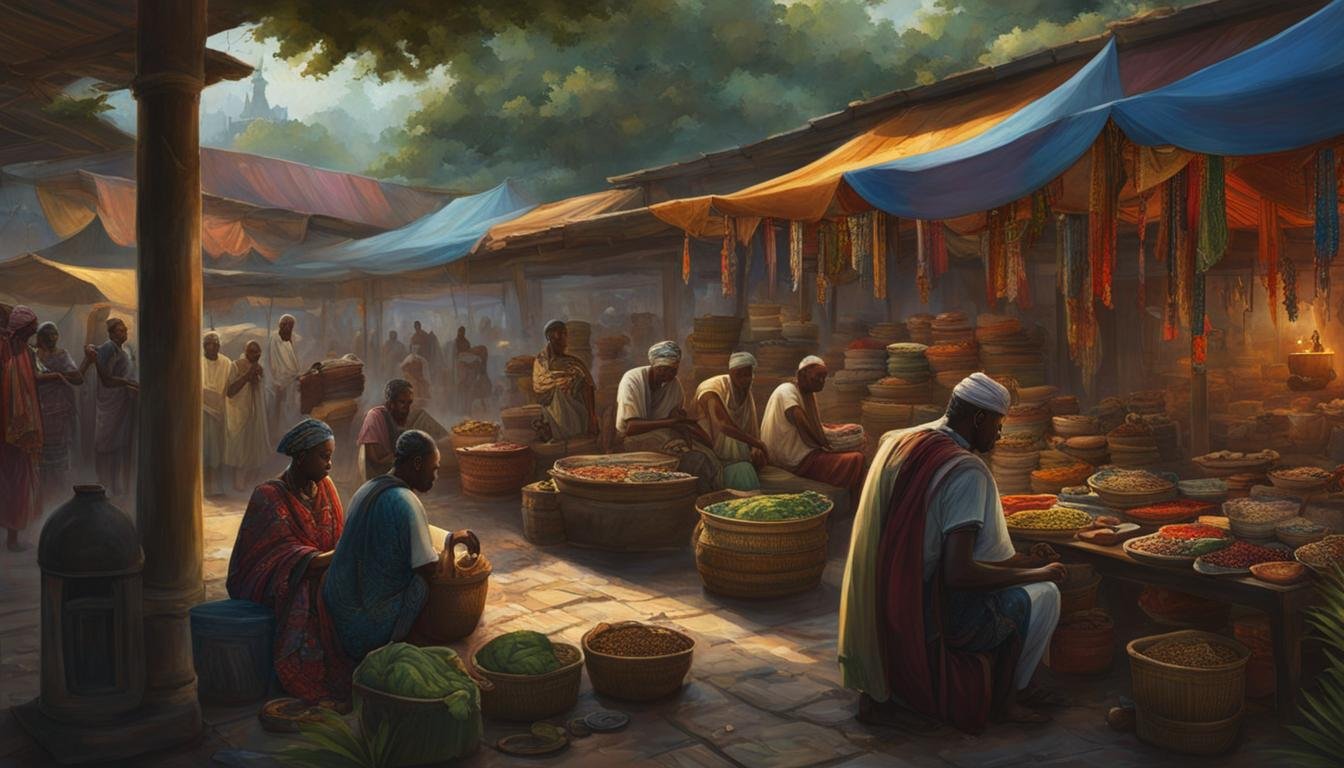Welcome to this captivating exploration of the rich history and vibrant culture of the Igbo Jews. In this article, we will delve into the fascinating heritage of the Igbo Jewish community, uncovering their roots, traditions, and unique customs. Join me as we embark on a journey to discover the captivating story of the Igbo Jews.
The History and Origins of Igbo Jews
According to Igbo Jewish tradition, their history dates back to the 8th century BCE when the Assyrians conquered Israel and captured many Israelites. The remaining tribes, including the tribe of Gad, dispersed and migrated to various parts of the world. Some of these tribes migrated southwest to what is now Nigeria, assimilating into the existing tribes and marrying among them. The Igbo Jews believe that they are descendants of the tribe of Gad and have maintained their Jewish customs and practices throughout the centuries.
The history of the Igbo Jews is steeped in legends and stories of their migration from Israel to Nigeria. They take great pride in their Jewish heritage and have established their own synagogues and communities in Nigeria. Despite facing controversy and criticism from some in the Jewish community, the Igbo Jews remain steadfast in their claim of being part of the broader Jewish community.
The Igbo Jews’ migration from Israel to Nigeria is a testament to their resilience and determination to preserve their Jewish identity despite being thousands of miles away from their ancestral homeland. Their stories and traditions are a testament to the enduring spirit of Jewish communities around the world.
Through the centuries, the Igbo Jews have passed down their traditions, beliefs, and practices from generation to generation, creating a unique blend of Jewish and Igbo customs. The Igbo Jews follow many Jewish traditions and observe practices such as observing Shabbat and keeping kosher. They also have their own prayer book and conduct unique rituals, including circumcising male children on the eighth day after birth and conducting wedding ceremonies under a canopy.
| Key Points | Details |
|---|---|
| Origin | The Igbo Jews claim to be descendants of the tribe of Gad, one of the ancient Israelite tribes. |
| Migration | After the Assyrian conquest of Israel, some Israelite tribes migrated to what is now Nigeria, assimilating into the existing tribes. |
| Beliefs | The Igbo Jews believe in one God and recognize the Torah as a holy text. They observe Jewish rituals and maintain their own unique traditions. |
| Practices | The Igbo Jews observe Shabbat, keep kosher, and conduct rituals such as circumcision and wedding ceremonies under a canopy. |
The history and origins of the Igbo Jews serve as a testament to the diversity and resilience of Jewish communities worldwide. Their migration from Israel to Nigeria, their preservation of Jewish customs, and their unique blend of Jewish and Igbo traditions all contribute to their rich cultural heritage. Despite facing controversy and criticism, the Igbo Jews remain proud of their Jewish identity and continue to pass down their traditions from one generation to the next.
Beliefs and Practices of Igbo Jews
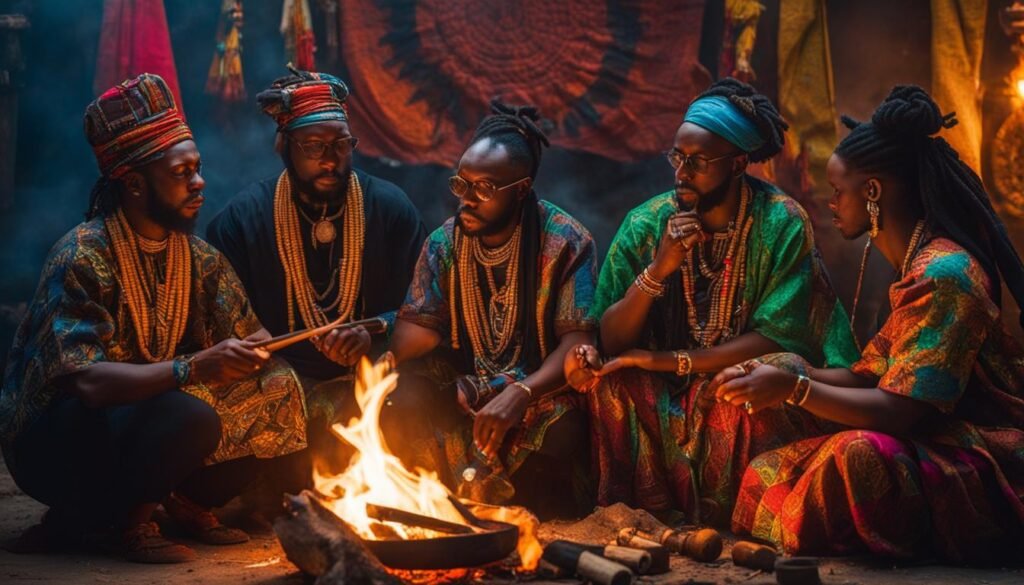
The Igbo Jews have a rich tapestry of beliefs and practices that form the foundation of their unique cultural identity. At the core of their religious observance is a strong belief in one God and the recognition of the Torah as a holy text. They follow many Jewish traditions and customs, such as observing Shabbat and keeping kosher. This deep faith and adherence to Jewish rituals reflect their commitment to preserving their heritage.
The Igbo Jews have developed their own prayer book, written in the Igbo language, which combines Hebrew words and prayers, creating a fusion of Jewish and Igbo linguistic and cultural elements. They observe important Jewish customs, including circumcision of male children on the eighth day after birth and adhering to dietary laws specified in the Torah. These traditions are passed down through generations, reinforcing their cultural and religious identity within their community.
Their commitment to preserving Jewish traditions is particularly remarkable considering that the Igbo Jews were not exposed to the Bible or Jewish missionaries before adopting these customs. Yet, they have embraced Judaism and incorporated it into their way of life with remarkable dedication and authenticity. Their unique blend of Jewish and Igbo customs and practices showcases the resilience and adaptability of their community, strengthening the bond between their Jewish identity and their Igbo heritage.
Igbo Jewish Customs and Traditions
The Igbo Jews have a rich tapestry of customs and traditions that reflect both their Jewish heritage and their Igbo cultural roots. These customs and traditions shape their identity and provide a unique lens through which they practice their faith and engage with their community.
Table: Key Igbo Jewish Festivals
Below is a table highlighting some of the key festivals celebrated by the Igbo Jews:
| Festival | Date | Significance |
|---|---|---|
| Shabbat | Every Friday evening to Saturday evening | A day of rest and spiritual reflection |
| Passover (Pesach) | 15th-22nd of the Hebrew month of Nisan | Commemorates the liberation of the Israelites from slavery in Egypt |
| Sukkot | 15th-22nd of the Hebrew month of Tishrei | Celebrates the temporary dwellings the Israelites lived in during their exodus from Egypt |
| Hanukkah | 25th of the Hebrew month of Kislev for 8 days | Commemorates the rededication of the Second Temple in Jerusalem |
| New Yam Festival | August | Celebrates the harvest of new yams, symbolizing abundance and thanksgiving |
These festivals are marked by joyous celebrations, prayers, traditional rituals, and feasting on special foods. They provide opportunities for the Igbo Jewish community to come together, strengthen their bonds, and pass down their traditions to younger generations.
“Our festivals are a time of great joy and celebration. We gather as a community, share meals, and engage in meaningful rituals that connect us to our Jewish heritage and our Igbo roots. These festivals serve as a reminder of our resilience and the richness of our cultural and religious heritage.”
In addition to these festivals, the Igbo Jews also observe other Jewish customs such as circumcision, dietary laws, and the use of prayer shawls and phylacteries. These customs and traditions are interwoven with elements of Igbo culture, creating a vibrant and unique expression of their faith.
The Igbo Jewish customs and traditions not only contribute to the spiritual and cultural identity of the community but also serve as a bridge between their Jewish heritage and their Nigerian roots. Through their practices, the Igbo Jews embody the harmonious coexistence of diverse cultural influences and inspire others to celebrate the richness of their own heritage.
Igbo Jewish Customs and Traditions
When it comes to customs and traditions, the Igbo Jews have a unique blend of Jewish practices and Igbo customs. They beautifully integrate elements from both cultures, creating a rich and diverse religious and cultural identity.
One of the notable customs observed by the Igbo Jews is the practice of circumcision on the eighth day after birth. This tradition aligns with Jewish customs and signifies the covenant between God and the Jewish people. Additionally, the Igbo Jews observe kosher dietary laws, abstaining from certain foods that are considered non-kosher.
The Igbo Jews also incorporate traditional Igbo customs into their religious practices. For example, they embrace polygamy, divination, and ancestor veneration, which are deeply rooted in Igbo culture. These practices reflect their desire to maintain their cultural heritage while also practicing Judaism.
“Our customs and traditions are a reflection of our identity, a testament to our strong belief in Judaism and our Igbo heritage.”
Table: Igbo Jewish Customs and Traditions
| Customs and Traditions | Significance |
|---|---|
| Circumcision | Symbolizes the covenant between God and the Jewish people |
| Kosher Dietary Laws | Observance of dietary restrictions in accordance with Jewish tradition |
| Polygamy | An acceptance of traditional Igbo marriage practices |
| Divination | A means of seeking guidance from ancestors and spirits |
| Ancestor Veneration | Honoring and respecting the ancestors as an integral part of Igbo culture |
Moreover, the Igbo Jews have their own marriage customs. This includes the payment of a bride price, a traditional practice in many African cultures, and the use of a chuppah or canopy during wedding ceremonies. These customs reflect the blending of Jewish and Igbo traditions, creating a unique and meaningful experience for couples.
The combination of Jewish practices and Igbo customs within the Igbo Jewish community showcases their commitment to preserving their religious and cultural identity. It is a testament to their resilience and their desire to celebrate the richness of their heritage.
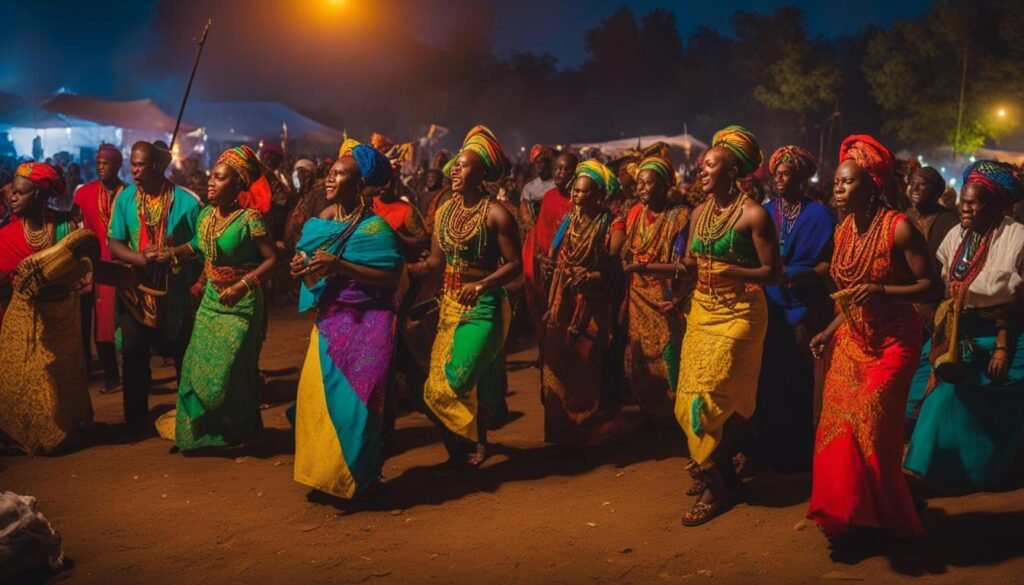
Igbo Jews’ Relationship with Israel and the Jewish Community
The Igbo Jews have a deep-rooted connection with the broader Jewish community and a strong desire to establish closer ties with Israel. Many Igbo Jews have made aliyah, or immigration to Israel, in an effort to reconnect with their ancestral homeland. Their migration to Israel has allowed them to deepen their understanding of Jewish customs and traditions and forge a stronger bond with fellow Jews from around the world. However, the Igbo Jews’ distinct beliefs and practices have raised skepticism and criticism from some in the Jewish community, leading to ongoing debates surrounding their authenticity and acceptance.
Despite facing skepticism, some Igbo Jews have converted to Judaism and have worked tirelessly to establish synagogues and Jewish schools in Nigeria. These institutions serve as important hubs for the Igbo Jewish community to learn, practice, and pass down their unique traditions and customs. By actively engaging with Jewish education and religious practices, the Igbo Jews continue to strengthen their ties with Israel and the global Jewish community.
The Igbo Jews’ diaspora and their ancestry as descendants of the ancient Israelites contribute to the fascination and intrigue surrounding their identity. While their historical connection to the biblical Israelites is a subject of ongoing research and debate, the Igbo Jews celebrate their heritage and maintain a proud Jewish identity. Their desire for recognition and acceptance within the Jewish community reflects their unwavering commitment to their faith and culture.
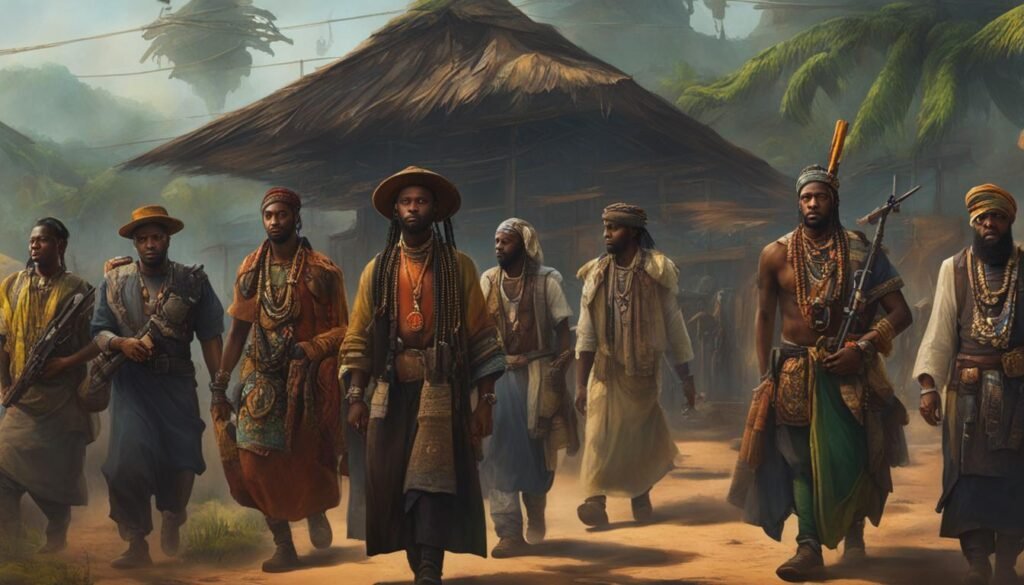
| Israel | Jewish Community | |
|---|---|---|
| Relationship | Strong desire to establish closer ties | Skepticism and criticism |
| Actions | Aliyah, establishment of synagogues and Jewish schools | Debates surrounding authenticity and acceptance |
| Igbo Jewish Identity | Reconnecting with ancestral homeland | Continued commitment to faith and culture |
Controversies and Criticisms Surrounding Igbo Jews
While the Igbo Jews have a deep-rooted belief in their Jewish heritage, controversies and criticisms have surrounded their identity and practices. Some skeptics question the authenticity of their connection to mainstream Jewish traditions and customs, suggesting a lack of tangible evidence. Others accuse some Igbo Jews of adopting Judaism as a means to escape poverty and discrimination in Nigeria. Accusations of cultural appropriation and misrepresentation of Jewish culture have also been leveled against the community. Furthermore, skeptics point out the absence of historical evidence supporting their claim as descendants of the biblical Israelites.
The controversies surrounding the Igbo Jews have sparked ongoing debates within the broader Jewish community. Some argue that the adoption of Jewish customs and traditions by the Igbo Jews lacks a sufficient historical foundation, leading to skepticism and resistance. Others believe that the rigid boundaries of religious identity should be open to interpretation and inclusivity, acknowledging the cultural implications and complexities of the Igbo Jews’ unique blend of Jewish and Igbo customs.
“The controversy surrounding the Igbo Jews illustrates the challenges of cultural and religious identity within a globalized community. While some may question their legitimacy, it is important to recognize the resilience and commitment of the Igbo Jews in preserving their faith and heritage.” – Rabbi David Cohen
Amidst these controversies, the Igbo Jews continue to navigate their religious and cultural journey, striving to foster closer ties with Israel and the global Jewish community. Their determination to maintain their distinct faith and traditions, coupled with their impact on Nigerian culture and society, demonstrates the resilience and importance of preserving cultural and religious diversity.
| Criticisms | Implications |
|---|---|
| Questioning authenticity of Jewish connection | Raises doubts about the religious and cultural legitimacy of the Igbo Jews |
| Accusations of cultural appropriation | Raises concerns about misrepresentation and lack of respect for Jewish culture |
| Skepticism regarding historical evidence | Undermines the claim of being descendants of the biblical Israelites |
| Claims of using Judaism to escape poverty | Casts doubt on the sincerity of religious conversion and commitment |
| Debates within the Jewish community | Highlights differing perspectives on the boundaries and inclusivity of religious identity |
Igbo Jews’ Impact on Nigerian Culture and Society
The Igbo Jews have made a significant impact on Nigerian culture and society, enriching the nation’s cultural fabric with their unique blend of Jewish and Igbo customs. Their movement to reclaim their Jewish heritage has sparked a revival of interest in traditional Igbo practices and traditions, highlighting the importance of preserving diverse cultural identities. The Igbo Jewish community’s presence has challenged colonial legacies and promoted religious diversity, contributing to the ongoing conversations about the intersection of Judaism and African identity.
Notably, the Igbo Jews’ impact extends beyond cultural and religious spheres. Many community members have become involved in political and social activism, advocating for the recognition of Igbo Jews as a legitimate religious community. They strive for greater understanding and acceptance of religious diversity in Nigeria, working towards a more inclusive society. Through their activism, the Igbo Jews aim to address issues of poverty, discrimination, and social inequality that affect their community and the wider Nigerian population.
“Our mission as Igbo Jews goes beyond preserving our faith and heritage. We believe in promoting justice, equality, and respect for all people, regardless of their religious or cultural background. By embracing both our Jewish and Igbo identities, we hope to contribute to a more harmonious and tolerant society in Nigeria.”
The Igbo Jewish community’s commitment to their beliefs and values has not only shaped local perceptions but also garnered attention on the international stage. They continue to seek closer ties with Israel and engage in dialogue with the global Jewish community. While controversies and criticisms persist, the Igbo Jews’ resilience and determination to preserve their cultural and religious identity serve as a powerful reminder of the enduring human spirit and the importance of embracing diversity in all its forms.
| Impact on Nigerian Culture and Society | Examples |
|---|---|
| Cultural Revival | Reviving interest in traditional Igbo practices and traditions |
| Promoting Religious Diversity | Challenging colonial legacies and advocating for acceptance of diverse religious identities |
| Social and Political Activism | Advocating for justice, equality, and social progress within Nigeria |
| International Engagement | Seeking closer ties with Israel and engaging with the global Jewish community |
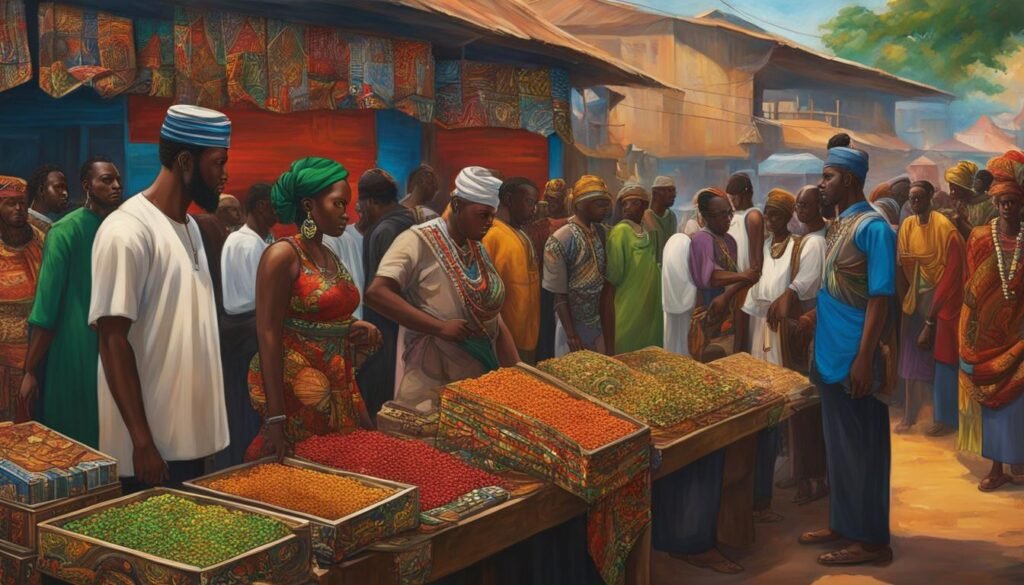
Conclusion
As I conclude this exploration into the history and culture of the Igbo Jews, I am struck by the fascinating diversity and resilience of Jewish communities worldwide. The Igbo Jews’ belief in their Jewish ancestry and their ability to maintain their faith while incorporating Igbo customs is truly remarkable.
Although the Igbo Jews have faced controversies and criticisms regarding their identity and practices, they continue to hold steadfast to their heritage, passing it down through generations. Their story serves as a powerful reminder of the strength of the human spirit in the face of adversity and the importance of preserving cultural and religious diversity.
It is clear that the Igbo Jews have had a significant impact on Nigerian culture and society, sparking a revival of interest in traditional Igbo customs and practices. Their presence has also played a role in challenging colonial legacies and promoting religious diversity in Nigeria.
As we reflect on the journey we have taken together, we are reminded of the value of recognizing and embracing different cultural and religious identities. The Igbo Jews’ story is a testament to the enduring power of faith and the richness that comes from embracing our diverse world.


